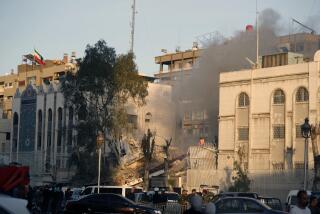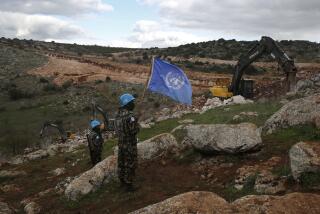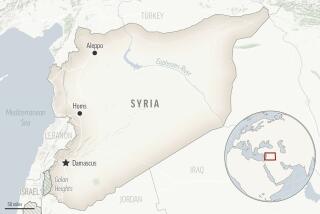Lebanon car bomb attack kills two, shatters months of relative calm
A suicide car bomb that may have targeted Lebanon’s internal security chief exploded Friday on the Beirut-Damascus highway, killing at least two people and wounding dozens, according to official and media accounts.
It was the first such attack after several months of relative calm in Lebanon and raised fears that the sectarian-fueled violence that has lately erupted in Iraq could be reverberating in this vulnerable Middle Eastern nation. Lebanon has long experienced episodes of spillover violence from the war in neighboring Syria.
According to various accounts of Friday’s attack, a booby-trapped four-wheel drive vehicle driven by a suicide bomber exploded close to a military checkpoint along the highway east of Beirut, the capital.
Lebanon’s internal security chief, Maj. Gen. Abbas Ibrahim, was quoted in local media saying that the explosion detonated moments after his convoy passed through the checkpoint.
Ibrahim heads Lebanon’s powerful General Security directorate. He has been a key player in an ongoing crackdown against Sunni Muslim extremists blamed for bombings in Lebanon, and has also helped negotiate the release of Shiite and Christian hostages held by Sunni rebels in neighboring Syria.
The two dead in Friday’s bombing included at least one security official, media reports indicated. Most of the victims appeared to be civilians traveling in a passenger vehicle.
The attack occurred after a reported security raid at a Beirut hotel that targeted terrorism suspects.
The Daily Star, an English-language Lebanese newspaper, quoted a security source saying that officials had received word that the Islamic State of Iraq and Syria was plotting a suicide attack in Lebanon.
ISIS, an Al Qaeda breakaway faction made up of Sunni fighters from various nations, is battling to topple governments in Syria and Iraq. Last week, the group made global headlines when its forces grabbed large swaths of land in northern and central Iraq, threatening the central government in Baghdad.
In recent months, Lebanese security forces have cracked down hard on militant Sunni factions, some linked to Al Qaeda, blamed for deadly bombings and other attacks in Lebanon during 2013 and early 2014. Friday’s blast broke a period of several months that featured an absence of car bomb attacks in Lebanon.
Lebanon, like neighboring Syria, is composed of a combustible mix of religious and ethnic groups. Lebanon experienced its own sectarian-fueled, 15-year civil war that ended in 1990. Lebanon’s fragile democracy faces severe threats from extremists inflamed by sectarian and geopolitical currents roiling the Middle East.
Follow @mcdneville for news from the Middle East
More to Read
Start your day right
Sign up for Essential California for news, features and recommendations from the L.A. Times and beyond in your inbox six days a week.
You may occasionally receive promotional content from the Los Angeles Times.






